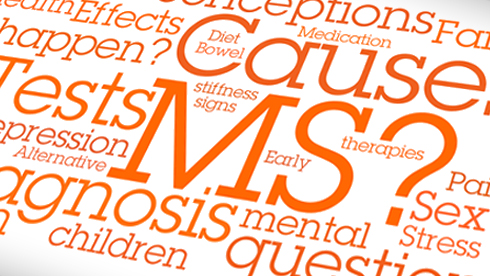
25 Oct Sleep and Cognitive Function in Multiple Sclerosis
Cognitive dysfunction is one of the most common symptoms of multiple sclerosis (MS). It is estimated that the majority of MS patients suffer from impairments in cognition, including processing speed, working memory, learning, executive function, visuospatial processing, and language dysfunction.1 These findings can occur early in the disease, and can affect adults and even children with multiple sclerosis.2 The significance of this symptom is the effect it has on quality of life, employment, and school performance of MS patients.
Multiple sclerosis patients have numerous sleep complaints and suffer from primary sleep disorders such as obstructive sleep apnoea, insomnia, and restless legs syndrome, which frequently go unrecognised.3 Undiagnosed and untreated obstructive sleep apnoea could be an explanation for some of the cognitive dysfunction that is seen in this population. The intermittent hypoxia and sleep fragmentation resulting from obstructive sleep apnoea creates diminishment in neurocognitive function in the general population, and likely has the similar or even greater effect in patients with multiple sclerosis. Obstructive sleep apnoea has also been shown to cause some of the same neuroimaging and neuropathological abnormalities in the cortex and axons as seen in patients with multiple sclerosis.3
Involved regions of the brain in obstructive sleep apnoea are identical to the areas involved with cognitive impairment in multiple sclerosis, such as the hippocampus, cingulate cortex, frontal, and parietal lobes.3 In obstructive sleep apnoea patients (without multiple sclerosis), treatment with positive airway pressure has shown improvements in hippocampal volume and white matter integrity, and normalize brain processes during cognitive tasks. This implies that treatment of obstructive sleep apnoea in multiple sclerosis patients may also lead to improvement in cognitive dysfunction symptoms along with improvement in some central nervous system destruction seen in these patients.3
Clinicians should be aware of the need of identification and treatment of sleep disorders, which are found at a higher rate in multiple sclerosis patients, as disorders such as obstructive sleep apnoea, insomnia, and restless legs syndrome significantly affect alertness, cognition, pain, mood, and overall quality of life.3 Though diagnosing and treating obstructive sleep apnoea may not explain all of the cognitive dysfunction in multiple sclerosis patients, a recent study published in the journal SLEEP makes the case that obstructive sleep apnoea’s role is more prominent than previously recognised. The article demonstrates relationship between polysomnographic measures of obstructive sleep apnoea (OSA) and sleep disturbance in multiple sclerosis patients and various standardised tests of neurocognitive function.4 Aims, Methods, Results and Conclusion of this study as follows:
Aim:
To examine associations between cognitive performance and polysomnographic measures of obstructive sleep apnea in patients with multiple sclerosis (MS).
Methods:
Participants underwent a comprehensive MS-specific cognitive testing battery (the Minimal Assessment of Cognitive Function in MS, or MACFIMS) and in-laboratory overnight PSG.
Results:
In adjusted linear regression models, the oxygen desaturation index (ODI) and minimum oxygen saturation (MinO2) were significantly associated with performance on multiple MACFIMS measures, including the Paced Auditory Serial Addition Test (PASAT; 2-sec and 3-sec versions), which assesses working memory, processing speed, and attention, and on the Brief Visuospatial Memory Test-Revised, a test of delayed visual memory. The respiratory disturbance index (RDI) was also significantly associated with PASAT-3 scores as well as the California Verbal Learning Test-II (CVLT-II) Discriminability Index, a test of verbal memory and response inhibition. Among these associations, apnea severity measures accounted for between 12% and 23% of the variance in cognitive test performance. Polysomnographic measures of sleep fragmentation (as reflected by the total arousal index) and total sleep time also showed significant associations with a component of the CVLT-II that assesses response inhibition, explaining 18% and 27% of the variance in performance.
Conclusions:
Among patients with MS, obstructive sleep apnea and sleep disturbance are significantly associated with diminished visual memory, verbal memory, executive function (as reflected by response inhibition), attention, processing speed, and working memory. If sleep disorders degrade these cognitive functions, effective treatment could offer new opportunities to improve cognitive functioning in patients with MS.
References:
- Amato MP, Zipoli V, Portaccio E, authors. Multiple sclerosis-related cognitive changes: a review of cross-sectional and longitudinal studies. J Neurol Sci. 2006;245:41–6.
- Cardoso M, Olmo NR, Fragoso YD, authors. Systemic review of cognitive dysfunction in pediatric and juvenile multiple sclerosis. Pediatr Neurol. 2015;53:287–92.
- Malhotra RK. The role of obstructive sleep apnea in cognitive dysfunction in multiple sclerosis. SLEEP2016;39(8):1489–1490.
- Braley TJ, Kratz AL, Kaplish N, Chervin RD. Sleep and cognitive function in multiple sclerosis. SLEEP2016;39(8):1525–1533.

